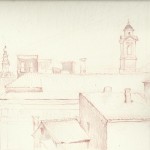
In The Marriage Plot, Jeffrey Eugenides third novel following The Virgin Suicides (1993) and Middlesex (2002), the author both deconstructs and reconstructs a theme of great interest to smart women—the ongoing value and prevalence of marriage in our culture.
As a literary device (seen in novels and film), the marriage plot centers on ‘the courtship rituals between a man and woman and the obstacles that the potential couple faces on the way to the nuptial payoff.’ In the novels of Jane Austen, George Eliot, the Bronte sisters, as well as Edith Wharton and Henry James, the marriage plot is used not only as a device for advancing the plot, but also, and perhaps more importantly, for providing social commentary on marriage itself.
Following the traditions of the marriage plot, Eugenides provides an interesting reconsideration of the importance of marriage in the 20th century (more precisely at Brown in the early 80s). He does this quite cleverly by creating three characters, Madeleine Hanna, Leonard Bankhead, and Mitchell Grammaticus, who inevitably form a love triangle. Early on, Mitchell declares, “‘I’m going to marry this girl!’ The knowledge went through him like electricity, a feeling of destiny.†But you have to stay tuned to see what actually happens.
What is interesting, however, is that Madeleine is a burgeoning Austen scholar (a Janeist) who is writing her honors thesis on the marriage plot. So, while finding her own academic voice, she is also exploring her own ideas of love and marriage. What becomes evident to her as the novel unfolds is that she faces many of the same historical and social struggles in determining what path to take on her personal and professional journey.
In the end, what makes The Marriage Plot a worthwhile read for smart women is its lively, fresh take on an established story line. And, although the author provides us with an authentic marriage plot for our times, the bottom line is that the desire to build intimacy and form a lifelong partnership is as powerful now as it was in Jane Austen’s day. Surely there are differences, yet marriage is alive and well in 2012.  And if Eugenides is right, it will be around for a long time to come.
